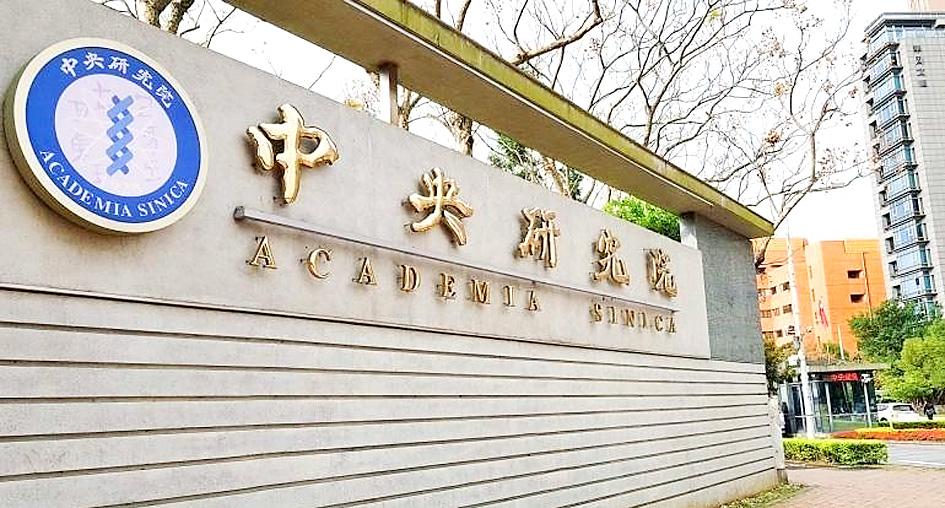Academia Sinica members are concerned the institution’s widely used Latin name might cause foreign researchers to mistakenly assume it is based in China, and it is deliberating a new name.
The institution plans to raise the issue at the legislature today, sources said, adding that Democratic Progressive Party Legislator Fan Yun (范雲) had also brought the issue up with Academia Sinica President James Liao (廖俊智) during a meeting of the legislature’s Education and Culture Committee in March last year.
Academia Sinica has sometimes been confused with the Chinese Academy of Sciences, as its Latin name translates to “Chinese Academy” in English, Fan said at the time.

Photo: Yang Yuan-ting, Taipei Times
Liao promised to ensure that Academia Sinica members discuss a name change, and has since formed an ad hoc committee for that purpose, which has met four times.
The committee in August drafted a report on proposed names, which was sent to researchers at the institution to discuss, sources said.
One proposal was to add the word “Taiwan” to the end of the existing name, so it would be titled “Academia Sinica, Taiwan.” Another was a direct translation of the institution’s Chinese name, making it the “Central Research Academy,” while other proposals were the “Taiwan Academy of Sciences” or the “Academy of Sciences Taiwan.”
In its report, the committee confirmed that confusion had been caused by the institution’s name, but said that there were some benefits to leaving it unchanged.
For example, the name is already associated with scientific achievements, so keeping it would ensure Taiwan’s reputation remains stable within the international academic community, whereas changing it would come with associated costs, the report said.
Changing it might also result in difficulties when cooperating with Chinese researchers, it said.
However, changing it would ensure that Taiwan receives credit for its outstanding research, the report said, adding that the committee found that most people asked about the proposals were in favor of adding “Taiwan” to the end of the name.
Fan on Saturday commended the institution for its progress on the matter, and said she welcomed further deliberation by all Academia Sinica members and researchers.

The combined effect of the monsoon, the outer rim of Typhoon Fengshen and a low-pressure system is expected to bring significant rainfall this week to various parts of the nation, the Central Weather Administration (CWA) said. The heaviest rain is expected to occur today and tomorrow, with torrential rain expected in Keelung’s north coast, Yilan and the mountainous regions of Taipei and New Taipei City, the CWA said. Rivers could rise rapidly, and residents should stay away from riverbanks and avoid going to the mountains or engaging in water activities, it said. Scattered showers are expected today in central and

COOPERATION: Taiwan is aligning closely with US strategic objectives on various matters, including China’s rare earths restrictions, the Ministry of Foreign Affairs said Taiwan could deal with China’s tightened export controls on rare earth metals by turning to “urban mining,” a researcher said yesterday. Rare earth metals, which are used in semiconductors and other electronic components, could be recovered from industrial or electronic waste to reduce reliance on imports, National Cheng Kung University Department of Resources Engineering professor Lee Cheng-han (李政翰) said. Despite their name, rare earth elements are not actually rare — their abundance in the Earth’s crust is relatively high, but they are dispersed, making extraction and refining energy-intensive and environmentally damaging, he said, adding that many countries have opted to

SUPPLY CHAIN: Taiwan’s advantages in the drone industry include rapid production capacity that is independent of Chinese-made parts, the economic ministry said The Executive Yuan yesterday approved plans to invest NT$44.2 billion (US$1.44 billion) into domestic production of uncrewed aerial vehicles over the next six years, bringing Taiwan’s output value to more than NT$40 billion by 2030 and making the nation Asia’s democratic hub for the drone supply chain. The proposed budget has NT$33.8 billion in new allocations and NT$10.43 billion in existing funds, the Ministry of Economic Affairs said. Under the new development program, the public sector would purchase nearly 100,000 drones, of which 50,898 would be for civil and government use, while 48,750 would be for national defense, it said. The Ministry of

UNITED: The other candidates congratulated Cheng on her win, saying they hoped the new chair could bring the party to victory in the elections next year and in 2028 Former Chinese Nationalist Party (KMT) lawmaker Cheng Li-wun (鄭麗文) yesterday won the party’s chair election with 65,122 votes, or 50.15 percent of the votes. It was the first time Cheng, 55, ran for the top KMT post, and she is the second woman to hold the post of chair, following Hung Hsiu-chu (洪秀柱), who served from 2016 to 2017. Cheng is to succeed incumbent Eric Chu (朱立倫) on Nov. 1 for a four-year term. Cheng said she has spoken with the other five candidates and pledged to maintain party unity, adding that the party would aim to win the elections next year and